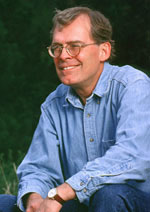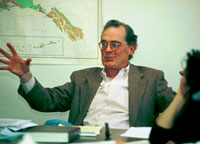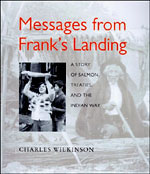As usual, Charles Wilkinson is pacing. Hands stuffed in the front pockets of his Levi’s, head down, he paces the lecture hall, up one stairway and down the other, his students’ heads swiveling to follow him.

Charles Wilkinson, law man.
Photo: Larry Harwood, University
of Colorado at Boulder.
But on this December morning, during the last meeting of Wilkinson’s natural resources law course at the University of Colorado at Boulder, the professor comes to a sudden stop. He’d like to read something from The Eagle Bird, a book he wrote some years back.
Wilkinson picks up the tattered hardcover stuffed with page markers and thumbs a few pages in.
“I would like to consider here the language of the law,” he reads, “why it is that the words of our laws do not carry the high pitch so evident in the arts and literature, why it is that laws do not speak of the wonder and majesty of the bald eagle.”
Lawyers say “that statutes must be absolutely precise,” he continues. “But why is it that a word like majesty does not help us a great deal in measuring something? . . . How is it possible to be precise about eagles without knowing of majesty?”
Laws must speak more reverently of forests and wild creatures, he says; language’s power to protect mustn’t be squandered.
The reading ends. “Thank you, my friends,” Wilkinson says quietly. And then the applause begins — spontaneous, heartfelt, an outpouring of thanks. For four months, these hundred students had toured the West with the lanky Wilkinson as their guide. They had clawed with him through the thickets of mining, water, timber, and grazing laws, and they had followed their professor as he ambled along irrigation ditches, scaled dam walls, and swam alongside salmon struggling to reach ancestral spawning grounds.
They had, with him, put themselves in the place of miners, ranchers, farmers, log-cutters, dam-builders, fishers — all determined to scratch wealth, or at least a living, out of the mountains and deserts of the West. They had learned of injustices suffered by Indians and Hispanics, of treaties broken and lands taken away.
Legal Eagle
In the West these days, no one is better equipped than Wilkinson to cover this vast legal terrain. He is among the region’s leading legal authorities in three major areas: natural resources, public lands, and Indian affairs. Certainly, no one cuts so skillfully across all three bodies of law. With these legal roads often converging in conservation debates, Wilkinson has established himself as one of the West’s leading voices on issues ranging from wilderness protection to Native American fishing rights.
But it’s more than his ability to explain and draw connections between complex issues that makes the 59-year-old Wilkinson influential. It’s also his willingness to share self-discoveries made while exploring red-rock canyons or squinting through the mist of a lush Northwest rainforest. Sometimes painful, sometimes exhilarating, often inspiring, Wilkinson’s feelings for the land are always close to the surface.
Few manage the dual role of analyst and rhapsodist so deftly.
He has greatly influenced numerous other conservation writers, including Terry Tempest Williams, author of the best-selling Refuge, who has hailed him as “a force in the American West like wind, like water, like love.” His passionate intellect has also landed him on the board of groups ranging from the Wilderness Society to the Grand Canyon Trust. In 1996, he drafted the proclamation signed by President Clinton establishing the Grand Staircase-Escalante National Monument in Utah.

Professing his love of the land.
Photo: Ken Abbott, University
of Colorado at Boulder.
More than a decade after he joined the faculty of CU-Boulder’s School of Law, Wilkinson concedes that there are still some colleagues who “wonder what the hell I’m doing . . . who think I bring too much emotion to what I’m doing.” But increasingly, he says, there is an acceptance “that if you don’t consider the way a place makes people feel, you’ve got an incomplete analysis” of conservation issues.
Which is why Wilkinson revels in the language of the U.S. Forest Service’s sweeping new management guidelines. Adopted in November, the guidelines make “ecological sustainability” the driving factor in managing national forests, allowing only timber harvests that don’t hurt the forests’ long-term health. Wilkinson helped craft the change, as the lone non-scientist on a Forest Service scientific committee that first proposed the new guidelines for forest management. Among the benefits of forests that the committee proposed be factored into management decisions are “beauty, inspiration, and wonder.”
Wilkinson smiles as he repeats the words, now part of the Forest Service’s administrative law. They speak of benefits not easily measured or cranked into a timber-cut analysis, he concedes, but benefits nonetheless.
A Connecticut Yankee in the Wild, Wild West
Wilkinson credits his father most for the passion that underlies his work. Their troubled relationship drove the younger Wilkinson west to Stanford Law School in the early 1960s. He had no interest in returning home to Connecticut after college in Ohio. Instead, Wilkinson recalls in his 1999 book Fire on the Plateau, he sought to get as far away from his father as he could.
But his father had also worked a positive influence — the native Southerner’s deep hatred of racism had stoked in the younger Wilkinson a burning desire to practice civil rights law.
He got his chance in 1971, as a staff attorney with the nonprofit Native American Rights Fund. By then, Wilkinson had been in the West for nearly a decade and couldn’t imagine living elsewhere. He had read every history of the Western states he could find. The landscape he’d once dismissed as barren now captivated him.
Wilkinson’s job with NARF took him to dozens of Indian reservations, some of the remotest lands he’d experienced. In countless walkabouts and late-night conversations, he was deeply moved by Indian people’s reverence for wild places. He witnessed first-hand their ancient ceremonies for expressing unity with nature, some weeks or months in the making.
“The Indian world view is, I think, the most sophisticated view of nature that exists anywhere,” he says — “a serious working philosophy.”

Wilkinson explores the application of the philosophy in his latest book — Messages from Frank’s Landing, the story of Billy Frank, Jr., and his leadership of Washington state’s resurgent Nisqually tribe. Wilkinson points out that 600 generations of “fish people” harvested salmon sustainably for 12,000 years in the rivers of the Northwest, before whites nearly wiped out the fishery in barely over a century. “An equality with the natural world, an actual belonging to the same community, is in the bloodstream of Indian people,” he writes.
Wilkinson’s vision of a healthy West doesn’t eliminate those who live hard on the land. Though his exhaustive analyses of the West’s tortured environmental history cut them little slack
, he still advocates a place for miners, ranchers, log-cutters, and even dirt-bikers. His spirit of inclusiveness — rare among the West’s leading conservation advocates — has won him respect among people on both ends of the environmental spectrum.
But the bottom line, he says, is clear: The region’s antiquated and shortsighted natural resources laws, which encourage a get-it-while-you-can approach, must be changed to emphasize sustainability.
More than anything, he argues in The Eagle Bird, the West needs to develop “an ethic of place,” premised on “the recognition that our species thrives on the subtle, intangible, but soul-deep mix of landscape, smells, sounds, history, neighbors, and friends that constitute a place, a homeland.”

